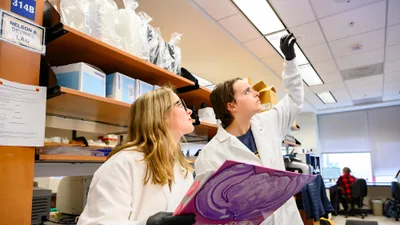The West Virginia University Eberly College of Arts and Sciences has named five recipients of the 2016 Outstanding Teacher Award: Nicholas Bowman, Patrick Hickey, Karen Kunz, Philip Michelbach and Jill Higgins Woods.
Nicholas Bowman, associate professor of communication studies, emphasizes the importance of students appreciating course material. Student voices are core class content, Bowman said. He encourages his students to expose themselves to critical feedback through discussion posts, uploading drafts of paper outlines to Google Docs for review and in-class presentations.
“Contact rather than content alone is key to successful education, as these contact points are often the spaces in which students can engage and overcome their confusions,” he said.
Bowman’s research interests include mass media, communication technology, entertainment media and experimental methods. He received his bachelor’s and master’s degrees in communication from the University of Missouri, St. Louis and his doctorate in communication from Michigan State University.
Patrick Hickey, assistant professor of political science, said that he employs an interactive teaching style that encourages students to make their own intellectual discoveries and form their own opinions about the political world. He uses multimedia content, such as podcasts, YouTube videos and news reports, to connect course content and assignments to real world events.
“I tell my students on the first day of class that my goal is to have my course be the class that semester where they both have the most fun and also learn the most information,” Hickey said.
Hickey’s research investigates how presidents build winning legislative coalitions in Congress. He received his bachelor’s degree in political science from the New College of Florida and his doctorate from the University of Texas at Austin.
Karen Kunz, associate professor of public administration, said it is essential that students are aware of the intricacies of the financial processes and issues faced by federal, state and local governments. To help her students understand these complex issues, Kunz collaborates with federal, state and non-profit professionals to bring their practices and issues into the classroom through guest lectures and course projects.
“It is equally important to her that students achieve the confidence that comes from comprehension of these complex issues through practical application,” Kunz said. “[Working with professionals] provides the students with the foundation necessary to effect change.”
Kunz’ research interests include public finance and fiscal policy, political economy and financial markets regulation. She received a master’s degree in political science and a doctorate in public administration from the University of Illinois at Springfield.
Philip Michelbach, associate professor of political science, constructs his courses around interpretive arguments on themes and historical developments in political thought. He engages with his students with daily discussion on the course’s assigned readings.
“I have been able to draw on my experiences to involve and engage our students,” Michelbach said.
Michelbach’s research interests are in political thought, and include German political thought, democratic theory and distributive justice. He received his bachelor’s degree in political science and a master’s degree in Germanic languages and literatures from the University of Kansas, a master’s degree in political science from the University of Houston and a doctorate in political science from the University of California, San Diego.
Jill Higgins Woods, a teaching instructor in the Department of English, said she hopes that her students learn to appreciate the value of writing in their respective fields of interest, as well as how to develop their writing skills to achieve their goals.
“I’ve been privileged to see the extension of in-classroom work to the outside world,” Woods said. “Both students who have excelled and struggled in my courses have honored me with glimpses into how they’ve understood and are applying our collaboratively constructed course experiences in their individual lives.”
Woods’ research interests include professional and technical communication and distance learning. She received a bachelor’s degree in English from Michigan State University, a master’s degree in English from Eastern Michigan University and is currently an education doctoral candidate at West Virginia University.



